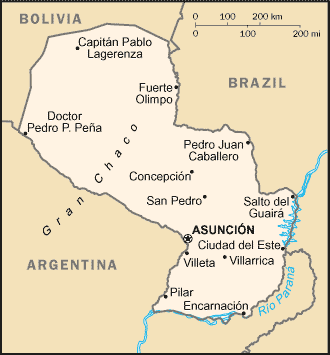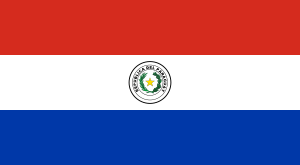Paraguay

Paraguay is a small (it used to be larger; keep reading to find out what happened), landlocked country in central South America, and is known for having an incredibly bloody history. Originally inhabited by semi-nomadic Guarani-natives, the Spanish moved in and colonized the area during the 16th Century. The Jesuits founded a number of missions in the area, and played a big part in the country's early history. Generally considered a backwater, not much happened until the Spanish were overthrown in 1811.
The first leader of an independent Paraguay was a peculiar fellow named Dr. Francia, though he preferred to be called El Supremo. Ruling as an absolute dictator, he instituted a number of changes. While brutal, some of them actually helped Paraguay later on. For instance, he forbade the remnants of the Spanish nobility from marrying other Spaniards. If they wanted to get hitched, it would have to be with one of the Guarani natives. This allowed Paraguay to avoid some of the racial tensions that troubled other nations in the Americas. Francia also confiscated church money and property, instituted draconian and isolationist economic protectionism, and eventually ordered the extermination of all dogs in Paraguay. If people keep calling you El Supremo, it's easy to start believing it...
Dr. Francia is still highly regarded in Paraguay, perhaps because, for all his brutality, he was very honest. Despite having absolute power, he was extremely frugal, and the state treasury doubled in wealth during his tenure. He also managed to preserve Paraguayan independence during the chaos of the early 19th Century. Critics would argue (not to his face) that this came at the cost of creating an isolated and paranoid nation that was dependent on an authoritarian strongman.
Francia died, and a series of juntas took control. Power was finally consolidated by Carlos Antonio Lopez, who was more of a typical dictator. Things got interesting when his son, the bloated and vainglorious Francisco Solano Lopez, came to power. Francisco wanted ever so badly to be the next Napoleon, and decided that he'd do just that. Helping him was his wife, an Irish courtesan named Eliza Lynch, whose presence scandalized Paraguayan high society.
What followed was the War of the Triple Alliance, one of the bloodiest wars you've never heard of. Lopez had mucked around in the politics of neighboring Uruguay, eventually causing enough trouble for Uruguay, Brazil, and Argentina to all declare war on him. Paraguay did have a big army, but any rational observers could tell that Paraguay was doomed. Sadly, rational observers were in short shrift under Lopez, who'd achieved a Cult of Personality.
The war raged until most of the Paraguayan troops lay dead in the field. This didn't stop Lopez, however, who began to conscript children and the aged to fight at the enemy, having them throw rocks when they ran out of bullets. Loving their leader to the bitter end, the Paraguayans kept fighting and losing. When a Brazilian soldier finally killed Lopez, it is estimated that 90% of Paraguay's male population had died.
With less land and much fewer people, Paraguay was mostly forgotten by the rest of the world until the 1930s, when they fought the Gran Chaco War against Bolivia. As the name suggests, the war was fought over the Gran Chaco, a hot, mosquito-infested piece of land that's almost worthless. Paraguay actually won this fight. Dr. Francia's breeding policies did create a unified culture, unlike the racially stratified society of Bolivia. This enabled Paraguay to outlast their rival. The League of Nations helped to end this war, one of the few things they ever did that might be considered a success.
Starting in 1954, Paraguay was ruled by a man named Alfredo Stroessner. Stroessner could have almost been the axiomatic right wing Latin American dictator, ruthlessly culling repression (especially communists). Yes, the United States did consider him an ally. A coup finally kicked him out in '89, and a new constitution (established in 1992) established a democracy.
Paraguay's managed to maintain its democracy, and will hopefully continue to do so. A former priest (and Liberation Theology advocate) named Lugo is now president. Though a leftist, he has had to make compromises with the right-dominated Senate. Will things continue on a democratic path? One can only hope...
the paraguayan flag
